This website is supported by its readers. If you click one of my links I may earn a commission. I am also a participant in the Amazon affiliates program and I will also earn a commission from qualified purchases.
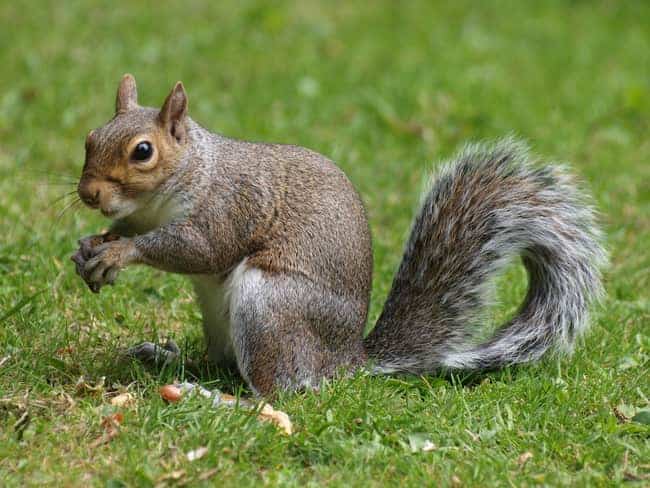
Squirrels are rampant in pretty much every country. It’s estimated that there are around 2.5 million wild grey squirrels in the UK and about 2 million grey squirrels in the USA. This got me thinking, do squirrels eat bonsai trees?
Squirrels will eat and damage bonsai trees. A squirrel’s diet is made up of leaves, bark, seeds, nuts, and fruit, all of which are commonplace in bonsai species. Avoid fruiting bonsai in particular which squirrels have been known to dig up and damage severely.
So how do you stop squirrels from eating bonsai? And why do squirrels eat bonsai trees? keep reading to find out more?
Just a quick heads up, over the past three years of running Plantpaladin, hundreds of people have asked for product recommendations. As such, You can find my favorite indoor bonsai tree here (link takes you to Bonsaiboy), my favorite outdoor bonsai tree (link takes you to Bonsaiboy), or have a look at all the products I recommend here.
Do squirrels eat bonsai?
So recently I’ve been noticing a lot more squirrels in my backyard, digging through the leaves searching for fruit as the early fall starts.
One of the things squirrels are notorious for is digging up and ruining things like flower beds, roots, and small shrubs and trees as they search for food.
This got me thinking, with bonsai trees being smaller than traditional trees are they not more vulnerable to squirrels? Do squirrels eat and attack bonsai trees?
Well, luckily I got in touch with my local bonsai botanical gardens and did a quick survey of plant paladin readers.
Here’s what I found:
- Squirrels will eat bonsai trees.
- In particular, squirrels will eat the roots, flowers, bark, leaves, fruit, and seeds of your bonsai
- Smaller bonsai then or bonsai made from cutting or seedling are more at risk of significant damage caused by squirrels.
- Squirrels will tend to eat or consume bonsai trees during the fall or winter when food sources from other places such as the fruit or nuts from trees become more scarce.
- Squirrels do not hibernate meaning they can often feed on bonsai trees during the winter months – especially on non-deciduous species that produce leaves year-round.
How do I keep squirrels from eating my bonsai trees?
So now we know that squirrels eat bonsai trees, what are the methods you can follow to prevent a squirrel from ruining the hard work and effort you have put into your trees?
To prevent squirrels from eating bonsai, spray your tree with strong odors such as pepper, garlic, peppermint, or peppermint oil. Keeping your bonsai in a cage or using a decoy bird can also help prevent squirrels from eating and attacking your tree.
Let’s explore these in more detail.
Use strong odors
Easily the best method of deterring squirrels from eating and damaging your bonsai (without killing them) is to use a strong offputting smell.
In particular, the following sprays work well:
- Garlic or garlic cloves
- Pepper
- Peppermint
- Peppermint oil
Simply water your bonsai as you would normally and then either spray, douse or plant the above items.
Using garlic in particular also works well as a fantastic deterrent for other pests such as insects.
Now there are a few other strong alternatives that work:
Covering a towel in apple cider vinegar and letting it rest on your bonsai bench – this method will work well for a few days but will need to be replenished often.
Another great option would be to spray the urine or blood of a predator of squirrels such as a red fox or coyote near your bonsai tree.
Mixing the blood or urine with spoiled eggs or cream will produce a foul smell that will defer the squirrels from your bonsai.
Just keep in mind that this smell will often be strong and last a few days and will be off-putting to you too.
Plant flowers squirrels don’t like
Whilst squirrels are notorious for attacking plants and flowers, there are few species that either scare or deter squirrels.
These include:
- Daffodils
- Hyacinth
- Lily of the valley
- Galanthus
Planting a few of these flowers and plants near where you keep your bonsai will often deter them.
Just keep in mind however a lot of these plants are seasonal and may only work to prevent squirrels from attacking your bonsai during the spring or summer.
Keep your bonsai indoors
A simple solution but it is super effective.
If your squirrel problem is rampant then one of the best things you can do is simply move the bonsai tree indoors.
Certain species of bonsai such as ficus or Chinese elms are very beginner-friendly, meaning that keeping them indoors for a few days/weeks won’t cause any significant damage to them.
It’s very rare for squirrels to make their way indoors so this can prove to be one of the best options out there – especially bonsai are often so small they can be easily moved.
Just ensure that you keep your bonsai near a window and give them enough water and sunlight should you decide to keep them indoors.
Use sticky rat traps
Alongside squirrels, rats and mice are also common pests that also attack bonsai trees.
As such, a method that works to remove rats and can also work to help remove squirrels from your bonsai is to invest in sticky rat traps.
Using these sticky rat traps works well for squirrels only when they cover the perimeter of your bonsai pot.
This way squirrels will have to walk onto the sticky traps if they want to get to your bonsai.
I’d also recommend keeping a few of these on the bottom of your bonsai bench too.
If, however, your squirrel problem is more rampant then again this will only be a part-time solution.
Create a bonsai cold frame
More often than not squirrels will attack your bonsai during the fall or winter when other food sources run dry.
As such it’s important to winterize your bonsai by keeping them in a bonsai cold frame.
I found that using something like a polystyrene container or shelving unit can work well, especially if placed in a garage.
Whilst this will help prevent squirrels. You might need a stronger material such as steel or iron to prevent rodents with stronger bites such as mice or rats from breaking into your cold frame.
For a full post on how to create a bonsai cold frame – check out this post here.
Use a bonsai cage
Now if you don’t want to move your bonsai indoors, or your bonsai does not need to be winterized then another option would be to create a perimeter around the bonsai to prevent squirrels from eating it.
This is mainly done in 2 ways:
- Creating a wire mesh around your bonsai
- Plant skewers around the edge of your bonsai pot
Creating a wire mesh
To create a wire mesh use chicken wire and create a small fortress around either the entirety of the pot or the entire bonsai.
Creating a mesh around the pot of your bonsai will prevent squirrels from digging up the roots or seed of your bonsai – I found that this method works particularly well when dealing with smaller-sized bonsai with cuttings.
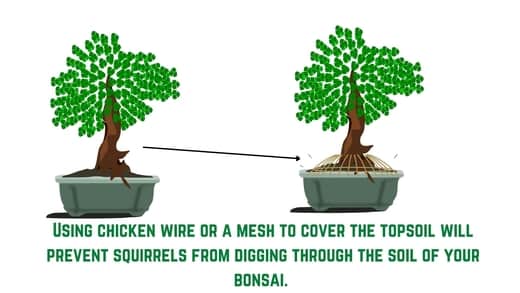
Another method would be to use a mesh around the entirety of your bonsai trees.
Ideally, this would be about 20% bigger than the widest point of your tree.
Aim for a rectangular cube-like shape and your bonsai tree should be protected from squirrel damage.
Whilst the squirrels will be able to climb the mesh they won’t be able to get inside.
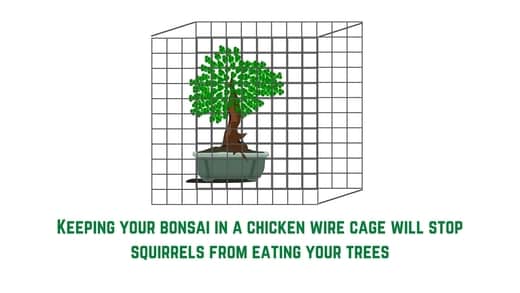
The chicken wire I recommend can be found on my post or bonsai trunk fusion.
Plant skewers around the pot perimeter
Another great method if squirrels are attacking the branches or fruit of your bonsai is to plant skewers around the perimeter of your bonsai pot.
Aim for these to start around 3 to 5cm tall and ensure that the skewers have a sharp edge.
This will stop squirrels from feeling comfortable eating your bonsai, interrupting their habits and preventing them from eating your bonsai.
This should also stop pet dogs or wild foxes from eating bonsai trees which, can be fatal to canines.
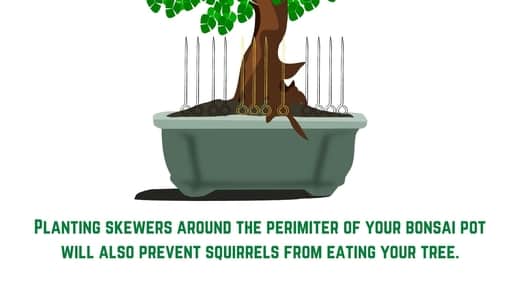
Invest in decoy birds
Whilst birds have also been known to damage or eat bonsai trees, investing in decoy birds made of plastic and keeping them near your bonsai will stop squirrels from eating your tree.
Squirrels have an innate fear of predators like birds so keeping decoy birds nearby can often scare them away.
Remove insects
Whilst squirrels are mainly herbivores they do often also consume a large number of insects to meet their protein needs.
Bonsai trees are notorious for insects like aphids, caterpillars, spider mites, slugs, and scale – all of which will be happily eaten by squirrels.
Even other animals such as frogs are sometimes consumed by squirrels
To avoid, ensure you take the relevant precautions using a good insecticide such as neem oil and checking your bonsai for signs of these bugs.
If no insects are infesting your tree, there is a smaller chance of your bonsai being eaten or damaged.
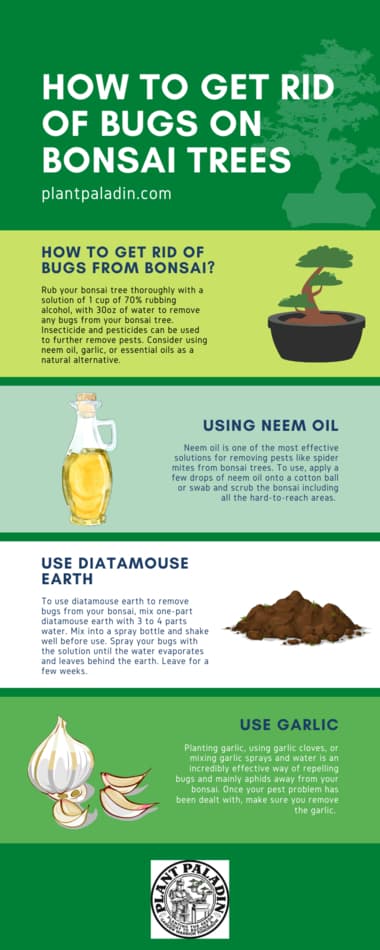
Call in an exterminator
Whilst squirrels can be considered cute to look at, they do cause a huge number of problems for not just bonsai trees, but any horticulture activity.
If you find that none of the above methods work and you are okay with the extermination of squirrels then I would consider calling an exterminator.
The following exterminator regulators I found work best for both the UK and USA:
- BCPA (UK)
- Western Exterminator Company (USA)
Why do squirrels eat bonsai trees?
Squirrels will most often eat bonsai trees during the winter months as other food sources become unavailable. Squirrels do not hibernate and so it is not uncommon to find squirrels eating the leaves, branches, or bark of your tree.
Problems of not stopping squirrels from eating bonsai
Left unchecked, squirrels will damage and in more severe cases kill your bonsai tree. Squirrels also carry several diseases such as typhus or ringworm which can be harmful to pests and can cause fungal infections on your tree.
What parts of a bonsai tree do squirrels damage?
Squirrels will mainly eat the seeds and fruit of your bonsai tree. Squirrels have also been seen to eat the leaves, bark, and branches of bonsai when other food sources become unavailable. This can cause significant damage to a bonsai tree in the process.
What bonsai species should you avoid if you have squirrels?
Bonsai species that produce fruit or nuts such as apple, lime, lemon, orange, cherry, chestnut, or crabapple should be avoided if you have a squirrel problem. Squirrels will eat the fruit for sustenance and damage your tree in the process.
Is bonsai toxic to squirrels?
Fiddle leaf fig, Foxglove, Juniper, Yew tree, and azalea bonsai tree species are all toxic for squirrels. Each of these can cause rashes, diarrhea, abdominal pain, kidney damage, and in more severe cases, death.
Do squirrels eat Japanese maple bark?
Squirrels eat Japanese maple bark and will often seek this tree species out. Squirrels use Japanese maple bark to line their nests, to control their teeth from growth, and to chew on when food becomes limited.
Keeping Japanese maple bonsai then can cause significant damage to the tree, often being preyed upon by squirrels more than anything else.
Do chipmunks eat bonsai?
Chipmunks will eat and damage bonsai trees. A chipmunk’s diet is made up of leaves, bark, seeds, and fruit, all of which are common in bonsai keeping. Avoid fruiting bonsai or bonsai that sprout nuts in particular which chipmunks have been known to dig up and damage severely.
Do squirrels eat bonsai – study
So finally I didn’t just want to give my opinion but also get a few bits of expert advice on the relationship between squirrels eating bonsai trees.
First, on a recent visit to my botanical gardens, I asked them if squirrels have eaten their bonsai trees, here were the results:
“Squirrels haven’t eaten our bonsai trees, however, we do keep them in protective cages which can deter small rodents”
I also asked 20 plant paladin readers if squirrels had eaten their bonsai, damage their bonsai or dig up their bonsai in the past 12 months – here were the results:
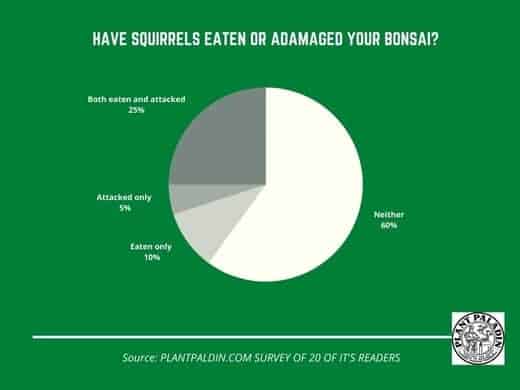
My top picks for the gear you will need!
So like I mentioned earlier, over the past three years of running PlantPaladin, hundreds of people have asked me for my recommendations on the best bonsai gear on the market.
Having spent thousands of dollars on bonsai items these past few years and tested at least 100 bonsai-specific products, I’ve listed my favorite products below – All of which I highly recommend and think you can get great value.
They can purchase directly by clicking the link to take them to Amazon.
Bonsai Tool Set: One of the significant challenges I’ve had is finding a toolset that was not only durable but didn’t break the bank. SOLIGT has recently developed a fantastic bonsai tool set that covers all the tools you need to trim, prune, and repot your trees. – You can grab it here.
Complete Bonsai Set: Many of you will want to grow your bonsai trees entirely from scratch, but finding the varicose seeds, pots, and other items in one place can be challenging. Leaves and Sole then have created a complete bonsai set that I’ve personally used that ticks all the boxes. You can grab it here.
Bonsai wire: The number of times I’ve run out of wire for my bonsai or purchased cheap bonsai wire that doesn’t do the job is embarrassing for me to admit. After a lot of trial and error, I found that using Hotop’s aluminum bonsai wire is one of the best options on the market. This can easily be used for both indoor and outdoor bonsai. You can grab it here.
This post was written by Fehed Nicass who has been passionate about bonsai for over 2 years. He currently resides in the UK and works in sales.
